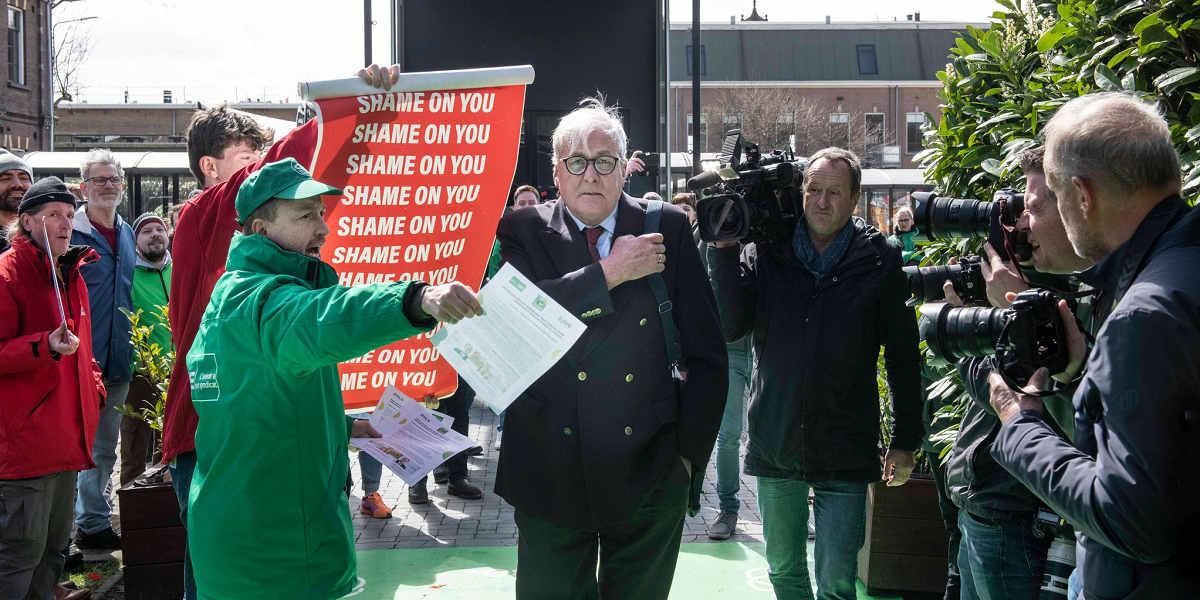Liam Kennedy
What has triggered this massive wave of action by Delhaize workers?
Rosetta Scibilla, Sacha Tenaerts, Eric Breugelmans, Myriam Djegham
The conflict originated at the workers’ council in March 2023. Despite making declarations to the contrary, Delhaize announced it was franchising 128 of its supermarkets and, in the process, completely destroying workers’ pay and terms and conditions. The company basically presented three slides that stated ‘we make more with franchised shops so we are franchising all of you.’
This is about Delhaize shirking all responsibility as an employer and maximising profit. The company keeps the benefits of a wide distribution network but our working conditions (and that of the franchise owner) are not their problem anymore. We know that franchising increases precarity; wages are around 30 per cent lower in franchised stores and agency staff are extremely common. As a result, we estimate that 50 to 60 per cent of the current staff could lose their jobs as a result of this plan. Unions are much more restricted under a franchised regime as well; shop stewards aren’t allowed for example. In March, one of Delhaize’s flagship franchised stores was shut down in Brussels over the use of uncontracted workers.
We think Delhaize has been put under pressure by the board of Ahold, the parent company. Delhaize’s margins are lower than the rest of the group but supermarkets made a lot of money during Covid-19. Ahold Delhaize has made €2.5 billion profit in 2022 and distributed €2 billion to its shareholders so this is not a decision borne of economic necessity, it is pure corporate greed.
Liam Kennedy
How did Delhaize workers come to the decision to go on indefinite strike? This seems like an unprecedented step in the country’s recent history.
Rosetta Scibilla, Sacha Tenaerts, Eric Breugelmans, Myriam Djegham
We didn’t start an indefinite strike but rather planned to strike until we were heard. Delhaize was imposing a radical decision on us and we wanted to respond in kind. Some of us have been working for Delhaize for 30 years and the company’s treatment of us is shocking.
Delhaize workers remember the fight in 2014 (where there was a restructure with over 2,000 layoffs) and we spontaneously re-enacted a similar strategy and closed shops by picketing them. Worker anger was quite intense because senior management had lied and of course the experience of Covid-19. Throughout the pandemic, we were on the front line, and we suffered, and now they thank us by selling us off.
The resulting strike and movement has been really exceptional. Workers’ resolve in the face of continued attacks by management has been inspiring and the strikes have continued for well over 4 months now. Compared to the UK, Belgium has a much stronger tradition of managed social relations and collective bargaining so the company’s intransigence has been quite shocking for workers, but also for the wider public.
Liam Kennedy
How are the workers managing to sustain the strike and garner support from the public? Some Delhaize clients have even joined the picket line and 25,000 people protested in Brussels in solidarity with the strike.
Rosetta Scibilla, Sacha Tenaerts, Eric Breugelmans, Myriam Djegham
There have been two phases to the movement. In the beginning we still had the right to strike and closed our shops. Then after a few weeks Delhaize started to use police, bailiffs and the courts to make that impossible. In that second phase we have had to rely on external support.
Given the protracted nature of this dispute, it has become important for workers to be able to earn some form of income to keep afloat. Workers created a system that allowed them to keep striking but work a few hours on a rotational basis with other workers. This minimised the loss of wages for the workers and maximised the impact on the employers as they still had to pay a significant part of wages and shops were still being picketed. This system spread quickly and allowed us to prepare for a long struggle.
We used the pickets to explain what Belgium’s supermarket strikes were about and to debunk Delhaize’s lies. We made flyers, talked to clients and also had a petition that was signed by over 50,000 people. On Saturdays we even did social events to keep morale high and raise awareness. We have attended every union meeting possible to talk about the strike to other companies and sectors. A number of other unions and shop stewards issued solidarity statements, and some came to the picket lines.
As a result of all this, Delhaize started to get more aggressive. At the workers’ councils we were met by police and security guards. We were searched before entering the room. Then they started forbidding us access to toilets while on strike and spreading lies to the workers. That’s more or less when they started hitting us with court decisions saying our right to strike did not include picketing because this impeded on the right to do business. If we did picket, we were threatened with €1,000 fines! The right to strike is a fundamental right that has been undermined by Delhaize’s imperative to make money for shareholders.
As a result of these court rulings, we started to take much broader action. We had a sectoral demo with over 2,000 workers where we spontaneously marched to the employer’s federation. We also started blockading Delhaize’s central warehouse. This was an effective strategy, but Delhaize called the centre-right Minister of the Interior, and police forcibly evicted the pickets with water cannons and riot gear.
Simultaneously bailiffs escalated their actions and were now stopping us from coming within 200 metres of our own shops. We were trying to keep the strike going as best we could through guerrilla tactics, walking out in the middle of shifts, flyering where we could and going back to the warehouses as often as possible. But they had taken away our main weapon and the state had sided with the bosses.
On 22 May 2023, 25,000 workers took to the streets in solidarity and in defence of the right to strike. We were calling for people not to enter the shops and a lot of customers were staying away. Sales have remained low in some areas as grows to boycott Delhaize became much more widespread.

Protests outside Belgium’s most important court in May 2023.
CREDIT: CNE
Red Pepper
Could you speak a little about the company and the wider political environment which seems to be very anti-worker?
Rosetta Scibilla, Sacha Tenaerts, Eric Breugelmans, Myriam Djegham
The relevant government officials are from parties that are extremely pro-business, the CEO of Delhaize was even seen drinking champagne with the prime minister at a lavish event last September. For them workers are just goods to be sold to the highest bidder. The right wing in this government reacted very quickly in favour of Delhaize whereas the social democrats and the greens have been quite cautious. They are buying the employers lies, for example on the fact that there won’t be any job losses.
Then there is a more general context of attacking the right to strike and to protest. The use of bailiffs and courts against strikes is not completely new but Delhaize took it to the next level. And in this context, they have put forward a new attack on the right to protest. They want to be able to forbid access to demonstrations to people condemned for disturbing the peace at a previous protest. What they are proposing is to ultimately reduce the right to protest and strike to the mere expression of opinion that does not disturb anyone or anything.
Liam Kennedy
What is the latest on the strikes? Does a resolution seem likely?
Rosetta Scibilla, Sacha Tenaerts, Eric Breugelmans, Myriam Djegham
To be honest, we are not sure we can stop this from going through. For some of the workers, it is now a question of getting a decent severance package rather than being sold off and forced to quit. Of course, not everyone has that option and this is not just a fight for Delhaize workers, it has important ramifications for wider corporate power and the kind of country that we want to leave behind for our children.
We are facing a giant multinational company that has the support of the courts and the state. Although we have received a lot of solidarity, it has not been enough to tip the scales in our favour. We have workers from other sectors participating in solidarity committees and coming to picket lines but it has mostly been individual, not organisational support. But let’s be clear, Delhaize workers remain angry and want to fight.
Liam Kennedy
What can be done internationally to help efforts? Delhaize’s shareholders obviously operate internationally, can any pressure be put on them?
Rosetta Scibilla, Sacha Tenaerts, Eric Breugelmans, Myriam Djegham
We got some solidarity statements from the Netherlands and Luxemburg, as well as from Indonesia. Some workers from CGT that were attacked on their pickets near Lille came to the demo in May but international action remains limited.
Ahold Delhaize makes 70 per cent of their sales in the US. A few years back we made some statements at the workers’ council here in solidarity with the striking workers in the US. But we did not manage to do the same now. What we need is visibility and solidarity. Visibility hurts Ahold’s brand. If Ahold is active in readers’ countries it would be great if people, organisations or unions could target them. Solidarity statements give us the energy to keep going and help us know that we are not alone in this fight.











